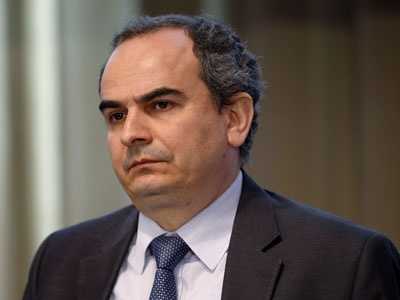By Emre Peker and Yeliz Candemir
ISTANBUL—Turkey is enjoying quite a turnaround. Exactly a year ago, economists questioned Governor Erdem Basci’s unorthodox policies and the central bank was forced to more than double interest rates to 12% in an effort to prop up Turkey’s plunging currency and to fight double-digit inflation.
Now, the $800 billion Turkish economy’s rebalancing in the past year has secured not only an investment-grade status from Fitch Ratings in November but also the “Central Bank Governor Of The Year” award for Mr. Basci from The Banker, a financial publication, helping to feed an already fiery surge in investor confidence.
The proof: a $1.5-billion 10-year bond sale on Tuesday at an all-time low yield of 3.473% amid overwhelming demand. That compares with a similar issuance in January 2011, when Ankara paid 6.35% to investors. What’s more, the Treasury’s lira-bond sales this week were 25 times oversubscribed, helping cut yields on the benchmark two-year debt to 5.96% on Wednesday.
“These sales show the positive outlook on Turkey. Economic stability and improvement in all the indicators in Turkey at such a turbulent time in global markets is increasing confidence in the central bank and the country,” said Cem Tozge of Ata Asset Management in Istanbul.
Turkey’s lure for investors is underpinned by improving fundamentals. Inflation slowed to 6.2% in December from a 3.5-year high of 11.1% in April; the current-account deficit narrowed to 6.5% of gross domestic product in October from 10% a year earlier; and 2013 economic growth is expected at more than 3.5% that’s set to outpace other emerging market peers such as Mexico, Poland and South Africa, according to International Monetary Fund forecasts.
To be sure, it wasn’t a slam dunk for Turkey and Mr. Basci.
When the governor initiated his unorthodox policy in October 2011, most economists accused the central bank of obscuring its monetary stance.
By January of last year, Tim Ash, Standard Bank Plc’s head of emerging market research who was then a chief economist at Royal Bank of Scotland Group Plc, RBS.LN +1.97% quipped: “The market is increasingly confused by the central bank’s policy strategy; it’s either going to win them a Nobel Prize or it’s a road to nowhere.”
Yet despite its complexity, it did neither.
“The result [of Mr. Basci’s policies], at least so far, is a soft landing for Turkey rather than the boom-and-bust scenario that was threatening to unfold,” The Banker said in awarding the central bank governor with its annual award.
But the mechanisms didn’t get any simpler. The central bank still uses an interest rate corridor where funding costs are set daily between 5% and 9%, manages market liquidity, shifts reserve requirements, and simultaneously targets the exchange rate, inflation and financial stability.
What’s more, Turkey’s success in the bond markets is not all of its own making: low interest rates around the world have left investors clamoring for places to park cash, leading to blowout bond deals of late for borrowers such as Mexico and even Mongolia.
Still, the country’s debt rating helps. Moody’s Investors Service is widely expected to award Turkey with a second investment-grade rating this year, which would unleash a flood of cash from foreign investors as the Treasury plans to raise about $8 billion in international debt markets.
“Because of the second-rating upgrade anticipation, interest rates will generally be on a downward trend,” said Ugur Kucuk, a fixed income strategist at Is Investment in Istanbul.
That’s good news for the Treasury, which recorded a 25 billion lira ($14 billion) deficit in 2012, compared with a 15.2 billion lira shortfall in 2011. The biggest gap since 2010 indicates that the government’s fiscal performance weakened amid Turkey’s economic rebalancing, where declining consumer spending sapped the state from tax revenues.
“I don’t think it’s an alarming situation as the government may make up for the widening deficit in 2012 by increasing revenues from privatizations this year,” Mr. Kucuk said. Then, pointing to demand for Turkish debt in international markets, he added, “Or the Treasury can just borrow more through bond sales.”
Erdem Basci,
monetary policy,
Turkey
via Turkey’s New Year’s Gift: Record Low Borrowing Costs – Emerging Europe Real Time – WSJ.


